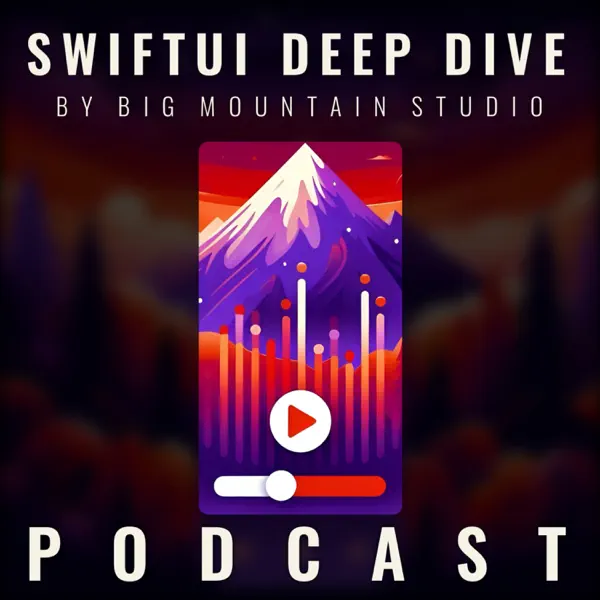- Jun 22, 2025
2025 Summer Plans: Books, Apps, and New Adventures
- Mark Moeykens
- BMS News

It's been a busy start to the summer, filled with exciting projects and discoveries!
Here's a look at what's been keeping me occupied at Big Mountain Studio.
In this post, you'll find updates on:
New Book
App Idea Inspirations
What is a "Foundation Model"?
What is Apple's Foundation Models Framework?
Specialized Models
Your Data + AI
AI Learning Book Format
New Podcast Learning Format
Boosting Personal Productivity with AI
Automated Screenshots?
Book Affordability
Is SwiftUI Views Mastery too big?
Separate Book Bonus Products
Diving into Xcode 26's AI
New Book
I'm thrilled to announce I've finished the SwiftUI Charts Mastery book.
Traveling provided the perfect environment for uninterrupted focus, allowing me to complete it.
App Idea Inspirations
Do you find yourself using the same AI prompt multiple times a day, week, or month?
Think about turning it into an app!
That's exactly what I plan on doing.
I built a large and versatile AI prompt I use for day planning, and it has ignited inspiration for a new app idea.
This app will leverage Apple's new Foundation Models framework...
What is a Foundation Model anyway?
First, let's break this down into simple parts:
-
What is a Model? - It's a knowledge base.
A Model is trained with data.
A Model can be different sizes; the bigger it is, the more it knows.
Models can be trained or "fine-tuned" to perform specialized tasks, such as working with language, images, or even code.
-
What is a "Foundation Model"? - A foundation to build upon.
Like creating a foundation for a house or building, it's a starting point.
Think of it like a high school graduate who has a general knowledge of everything. From here, they can build on that foundation and learn a specialized degree to perform a task.
Foundation Models you might know are OpenAI's GPT-4, Anthropic's Claude, or Google's Gemini.
-
What is a "Fine-Tuned" model? - A model with specialized knowledge.
You further train/customize/fine-tune a foundation model for a particular purpose.
This is a University graduate who has specialized training, on top of his general knowledge, to perform a specific task.
They can have different names, such as "Specialized Models" or more specific proprietary names like "MedicalAI", "TaxAI", or "LegalAI" (like the name of a degree).
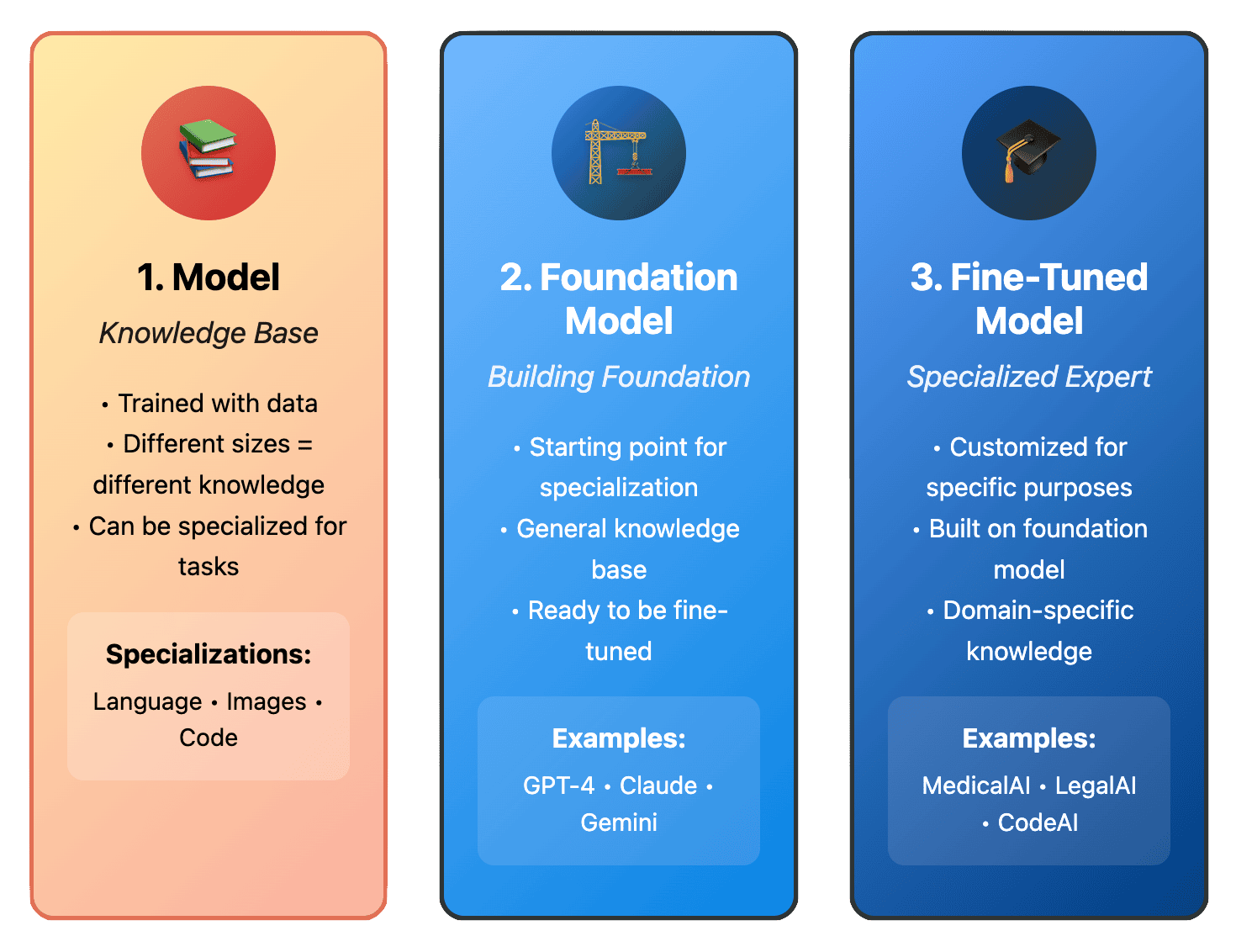
Apple's Foundation Model Framework
Now, think of Apple's Foundation Models framework as a foundation model wrapped in Swift code.
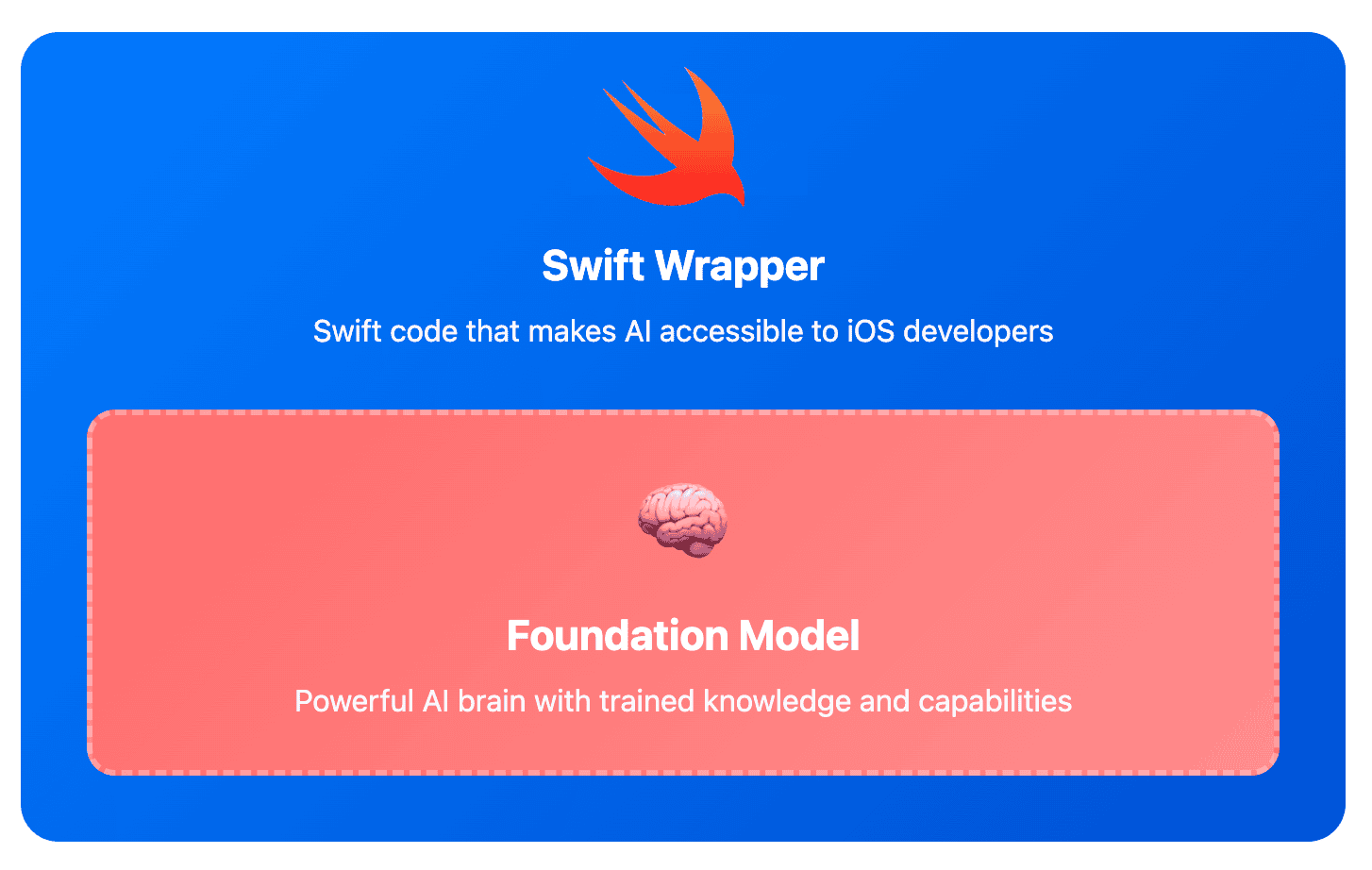
The benefits are compelling!

The more I explore this framework, the more fascinating I find it.
By the way, these images are produced by Claude. Not very fancy, but I use it to help visualize my concepts.
What about using Fine-Tuned for Specialized Models?
The Foundation Models Framework allows you to access other fine-tuned models or perform specialized tasks with the use of a "Tool".
Kind of a simple name, I know. 😃
But you build Tools to do everything else the Foundation Model can not do.
Your Data + AI
My research into the Foundation Models Framework has also led me to explore how to query custom or specialized data your app uses or proprietary company data, as we have at my full-time job.
While training or fine-tuning custom models isn't as straightforward as I'd like (yet), I've discovered a potentially easier way to achieve this.
It could be as simple as dragging and dropping your data.
I'm excited by the prospect of turning this into a service or app that anyone can use, though it's on the back burner, for now, as a lower priority.
AI Learning Book Format
I'm also exploring a new way to create visual, prompt-first book formats.
With AI accelerating our development efforts, I have ideas on how to help others adapt and speed up this process, enabling a deeper understanding of the topics they need to know to better prompt coding.
This, too, will take more research, iteration, and feedback from people like you:
New Podcast Learning Format
On the content front, I've been experimenting with a new podcast format.
This listening format is designed to enhance learning through repetition combined with a question-and-answer approach.
I've only produced 5 episodes as of now.
I want to get your feedback on the format to see if you think you, or other beginners, find the format helpful.
These episodes were created using my books as the knowledge base inside Google's NotebookLM with some "creative" prompting...that took forever to perfect. Then I do audio editing to clean it up.
Boosting Personal Productivity with AI
With so many projects in motion, organizing everything is key.
I've been experimenting with a new (and free) method for organizing projects and leveraging AI to help advance them.
This has led to a significant productivity gain.
The more advancements I make (or it makes with my oversight), the smarter the system becomes.
If there is enough interest in learning more about this, I could put together a short video showing the three-step process.
Automated Screenshots?
On the maintenance side, I have seven SwiftUI picture books, and I need to update all their screenshots.
I'm looking into automated solutions for this, possibly through tests that generate screenshots of all views.
If anyone has tips, ideas, or knows how to do this EASILY, I need your help!
The closest tool I've found to achieving what I need is EmergeTools SnapshotPreviews package. You can add it to your project, create one test, and it'll go through your project, find all the previews, and create a screenshot for testing.
BUT it doesn't automatically save all the screenshots to a directory where I can access them. (And in many cases, when I view the images, they are missing parts of the UI. This could be an Xcode 26 problem. 🤷♂️)
Book Affordability
Finally, I've been researching ways to make my books equally affordable across different markets.
The platform I currently use doesn't allow for dynamic pricing based on purchasing power (purchasing power parity).
However, I am starting to port my books to Amazon so I can adjust the pricing per market.
Here is an example of SwiftUI Charts Mastery for the Brazil market:
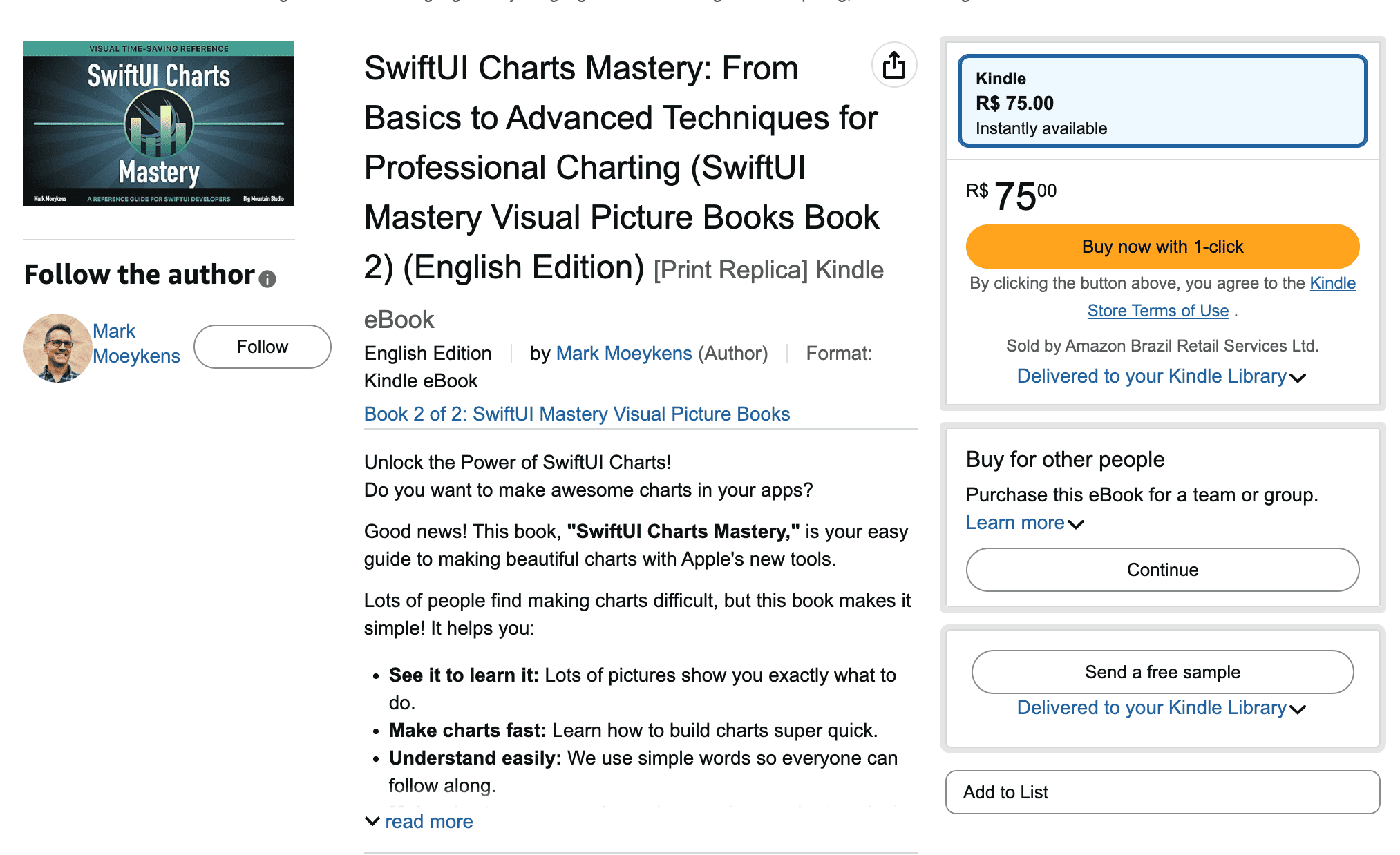
Limited markets
Amazon doesn't have all the markets where my customers are:

If you're in one of these markets, you can now buy SwiftUI Charts Mastery on Amazon!
Do you want to help?
If you own this book, please add a review! Reviews greatly help products on Amazon.
(If you search for "SwiftUI Views Mastery", you should find it.)
Other books are coming soon.
It's going to be a little slow. I have a 32-point checklist to prep every book to be published on Amazon. 😅
Which leads me to the next topic...
Is SwiftUI Views Mastery too big?
What started as only 300 pages 6 years ago has now grown to be over 1,000 pages!
Remember when it was a baby? 😃
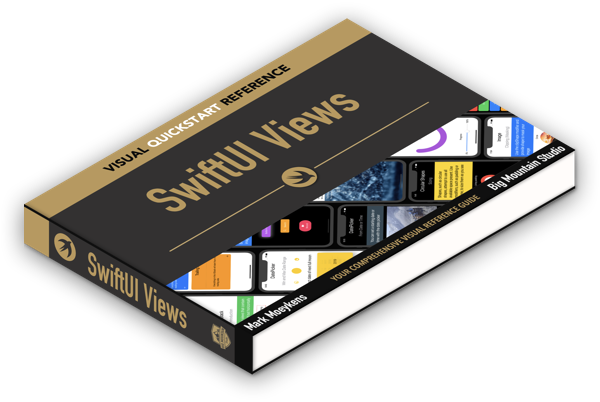
Problems with larger books
Most people will never finish it.
It started to create problems when exporting ePUBs because my laptop was running out of memory (I had to buy a laptop with 64 GB of RAM to fix it).
Customers run into problems downloading it (large file size).
Slower search performance within the book.
So I am splitting it up into two books!
SwiftUI Views Mastery - $34
Advanced SwiftUI Views Mastery - $34

(Colors not set in stone yet)
Together with the discounts, they'll be approximately the same price as $55:
The free book gives you 10% ($30.60) off your first book.
A paid book gives you 20% off all books ($27.20).
Once I have them split out, I will then put them on Amazon, price adjusted for market purchase parity.
What does this mean for you?
I don't know at this time.
It will be one book on my website for now, but 2 books on Amazon as soon as they are ready.
I need to research the capabilities of my platform to figure out how to do customer migrations, and so on, so people who currently own the book will automatically get both books.
Separate Book Bonus Products
Another change you will start to see is that bonuses that come with books (Xcode projects, sample apps, cheat sheets) will be separated out as a separate bonus product that is automatically included with your book purchases through bigmountainstudio.com.
Sales pages will be updated to reflect this too:

Customers who own SwiftUI Charts Mastery will currently see this on their product list page:

Why?
When a customer buys a book through Amazon, you can't include the bonuses. All they will get is the book. So I'm giving them a way to go to bigmountainstudio.com to download the bonuses separately.
Books will now come with a generic page at the beginning to guide readers on how to get the bonuses:

Diving into Xcode 26's AI
I've also been loving my experience with Xcode 26 so far.
The integrated AI features are a game-changer, even though I'm still learning the most effective ways to use them.
At work, we have an enterprise license to GitHub Copilot. So I'm used to using that.
Here are a few tips I've picked up for using AI in Xcode 26 for SwiftUI development:
-
Be Specific with Prompts: The more detailed and contextual your prompts are, the better the AI's suggestions will be.
Tell it which iOS version you're targeting to avoid deprecated suggestions or objects you can't support yet.
Tell it what styles you want. If you don't know all of the available styles for a control, look at my books.
Leverage Context: Xcode's AI is context-aware. Use the
@symbol to reference specific symbols, files, or even selections in your source editor to give the AI more information about what part you're working on.Iterate, Commit, and Refine: Don't expect the first suggestion to be perfect. Start small. Use the AI to generate a starting point, then iterate on the suggestions by providing more specific instructions or clarifications. If it works, commit your changes and then iterate/refactor.
Review and Understand All Generated Code: Always review AI-generated code for accuracy, efficiency, and to ensure it aligns with your project's coding standards. It's a powerful assistant, but if you don't know what it is creating, it will lead you into a death spiral (where the code gets so complex and broken that even AI can't fix it, or AI will either wipe out all the code, or you will just start over). Use my books to gain clarity on what you want to achieve and use that to guide AI.
That's all from me for now.
It's going to be a productive summer at Big Mountain Studio!

